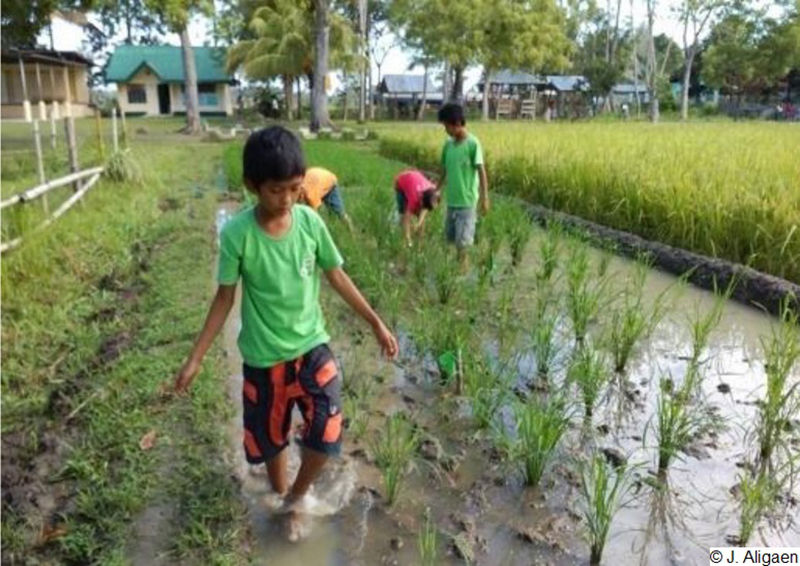
The students get hands-on training at the Student Field School in one of the pilot areas of the project. (Photo courtesy of Wenhui Award)
Prof. Julito C. Aligaen of ISAT U Leon Campus was cited by UNESCO Asia-Pacific Programme of Educational Innovation for Development (APEID) in developing the award-winning Organic Agriculture Project Integration in Basic Education through Student Field School. The project emerged as winner in the 2018 Wenhui Award for Educational Innovation.
The project was awarded because it “demonstrated that experiential and discovery learning based on present socio-scientific issues is the most effective way for students to understand sustainable development issues.”
The project aimed at the sustainable production of healthy and nutritious foods without using synthetic fertilizers and harmful pesticides. Dr. Aligaen said that it focuses on “nutrient management, crop protection and environmental education.” The project targets the youth who are expected to be the next generation farmers.
It was chosen for the award as it reflects this year’s theme, Innovations in School, Family, and Community Collaboration for Quality Education which carries the important message that education is everyone’s responsibility.
Dr. Julito C. Aligaen
With collaboration from different government agencies, organizations and the local government unit of Davao del Norte, Dr. Aligaen took part in the project in 2014 while teaching at Asuncion National High School. He laid out the integration and strategies of promoting organic farming to English, Science and Math subjects in pilot schools of the region.
On the same year, he transferred to ISAT U Leon Campus. Even with his new assignment, he continued in developing the project.
One of its innovations is the Student Field School. “We utilize Student Field School system in this project,” Aligaen explained, ‘hands-on education in organic farming is practiced in the production center or laboratory of participating schools.” Another innovation is the Stand Alone Lesson Plan for teachers who had not undergone formal training. A Teacher’s Guide, “the Bible” of the project, is also developed.
“In one of our pilot schools, the vermi-compost production is now stable and they were able to market some of their products,” Aligaen shared on the success of the project.
Aside from the Certificate of Excellence, a 20, 000 US dollar prize will be given. The Technical Working Group decided to use the money for the improvement of the program. “ I am now in the process of conceptualizing a possible collaboration with Department of Agriculture and Department of Education. A course in BS Agriculture major in Organic Agriculture is also considered,” said Dr. Aligaen.
In 2010, Wenhui Award for Educational Innovation was established by UNESCO APEID and the National Commission of the People’s Republic of China for UNESCO to emphasize the capacity of education and the human innovative spirit to address and resolve pressing issues and problems.